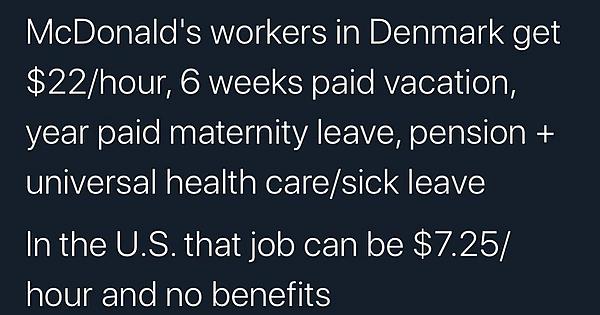I'm citing the NYTimes because you're a Lib and you're supposed to pass this along to your Lib-ass friends.
https://www.nytimes.com/2020/05/08/opinion/sunday/us-denmark-economy.html
Starting pay for the humblest burger-flipper at McDonald’s in Denmark is about $22 an hour once various pay supplements are included. The McDonald’s workers in Denmark get six weeks of paid vacation a year, life insurance, a year’s paid maternity leave and a pension plan. And like all Danes, they enjoy universal medical insurance and paid sick leave. One reason Denmark was more effective than the United States in responding to the crisis is that no Dane hesitated to seek treatment because of concerns about medical bills.
Abu Sayeed knew that Americans working in fast food don’t do so well. “I heard about the movement,” he said, trying to remember its name. “Fight for something. Fight for $20? What was it?” “Fight for $15,” I explained. “They want $15 an hour. There was an awkward silence. He nodded sympathetically. Then he tried not to sound condescending. “I feel for them,” he said earnestly of American workers at McDonald’s.”
Danes pay an extra 19 cents of every dollar in taxes, compared with Americans, but for that they get free health care, free education from kindergarten through college, subsidized high-quality preschool, a very strong social safety net and very low levels of poverty, homelessness, crime and inequality. On average, Danes live two years longer than Americans.
A Big Mac flipped by $22-an-hour workers isn’t even that much more expensive than an American one. Big Mac prices vary by outlet, but my spot pricing suggested that one might cost about 27 cents more on average in Denmark than in the United States. That 27 cents is the price of dignity.
Americans assume that Danish wages must be high because of regulations, but Denmark has no national minimum wage, and it would be perfectly legal for a construction company or a corner pizzeria to hire workers at $5 an hour. Yet that doesn’t happen. The typical bottom market wage seems to be about $15 — about twice the federal minimum wage in the United States, a country with a roughly similar standard of living. Why is that?
One reason is Denmark’s strong unions. More than 80 percent of Danish employees work under collective bargaining contracts, although strikes are rare. There is also “sectoral bargaining,” in which contracts are negotiated across an entire business sector — so in Denmark, McDonald’s and Burger King pay exactly the same — something that Joe Biden suggests the United States consider as well.
Yet there’s another, more important reason for high wages in Denmark.
“Workers are more productive” in Denmark, Lawrence Katz, a labor economist at Harvard, noted bluntly. “They have had access to more and higher-quality human capital investment opportunities starting at birth.”
In contrast, after half a century of underinvestment in the United States, many 20th-percentile American workers haven’t graduated from high school, can’t read well, aren’t very numerate, struggle with drugs or alcohol, or have impairments that reduce productivity. Increasingly, I came to see that emulating a Danish-style system of high wages wasn’t just about lifting the minimum wage but, even more, about investing in children.


Until very recently Denmark was very white and very small (not counting Greenland and the Faroes, that are Danish colonies and Danes have let's say less than stellar history there) so they're still not used to the huge international influx over the last few decades. As a result it can be quite difficult to find a job as a non-dane, especially if you don't have education/skills. It's easier in IT and software. For a lot of places Danish is mandatory even if you don't really need it for the job, and that usually means that if you talk with an accent it's not good enough. Often you won't be considered for positions just on the basis of your name. Everyday casual racism is somewhat spread (I'm pasty white but Eastern European, so I blend in until I speak), and as a foreigner it is fairly common to be asked "when are you going back" in one form or another, and Danes kinda look down on you. A friend of mine who is Thai, has had the cops called on him numerous times when working as a post and has been called the n-word a lot...
So, a similar dynamic as you would find in England, with the whole 'Eastern Europeans/ex-Soviets are taking our jobs' kind of thing.
And I'm guessing their anti-Asian and anti-African sentiments were mostly adopted, rather than the product of their own history.
Its more looking down on Eastern Europeans. I feel like its a lot stronger against asian and african people. For example just today one of the biggest media sites ran a story on how 25% of the infected with Corona have non-western background. And you often see titles like that. A couple years ago the folkepartiet ran some pretty gloomy anti-immigrant posters. The government also wanted to deny people from the EU the same beenfits it gives danes when studying in university, cause it wanted to encourage them to go back to their home countries after graduating or something like that.